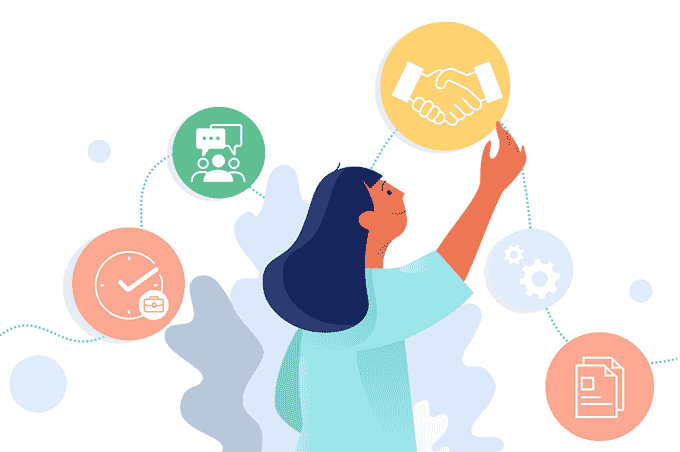
What Are Soft Skills? 
Soft skills are non-technical abilities that help you work and communicate with other people. Listening, communication and delegation are all examples of soft skills. As the world continues to change in response to COVID-19, many businesses and employees are recognizing the importance of developing soft skills and acknowledging the impact they have on the workplace.
According to LinkedIn Learning, the Top 5 soft skills employers look for in an employee are:
- Creativity
- Persuasion
- Collaboration
- Adaptability
- Emotional Intelligence
Other important soft skills can include professionalism, critical thinking, and interviewing. Developing and mastering these soft skills will help you interview well, therefore securing a job long term and continuing to grow in your career.
How Do I Develop My Soft Skills?
Workforce trainings from accredited partners can help prospective employees hone their skills, like resume building, interview success, how to make a good first impression, and more.
- CareerSource Pasco Hernando:
- Spherion Staffing Services
- GCF Global: A free education website that offers tutorials to help you learn the essential skills to live and work.
Prepping for a Job Interview
- Become familiar with the company you are interviewing with.
- Review frequently asked questions for interviews and prepare answers.
- Be ready to describe your past job experience and how it relates to the job you are interviewing for.
- Dress appropriately, in business casual attire.
- Bring extra copies of your resume and cover letter.
- Be on time! Make sure to leave for the interview early to account for possible traffic.

Ace the Interview
- Make a good first impression! Have a firm handshake, smile confidently, and introduce yourself assuredly.
- Have good posture and keep fidgeting to a minimum.
- Speak clearly and maintain eye contact.
- Speak positively of your last job, and do not speak badly of your last employer regardless of how things left off.
- Be prepared to answer the question "Tell me about yourself."
- Tie your past skills in with your experience and how it will impact your potential employment.
- Be able to explain any gaps in employment.
- Send a follow-up email thanking them for the opportunity to interview.
- When sending email communications, always address them professionally with fully thought out content, and include your personal email signature with name and contact information.
Interview tips courtesy of Doherty.com.
What it takes to be a Good Employee
BE RELIABLE
- Life sometimes happens! Do what you can as an employee to plan ahead for the unexpected.
- Give yourself enough time to get to work ON TIME.
- Schedule childcare accordingly so it doesn't interfere with work hours.
- Have or coordinate reliable transportation to and from work.
- When/if barriers arise, communicate well in advance with your employers and/or HR department.
BE DEPENDABLE
- Employers can tell when employees care about their company and the work being produced.
- Stay engaged and on top of your schedule and tasks.
- Stay positive and a caring co-worker.
- Always be a team player! (hard work is often recognized with incentives)
BE COURTEOUS
- A self-confident persona, smile, and friendly attitude can go a long way when establishing strong workplace relationships with your supervisor, co-workers, and customers/clients.
- Make an effort to be friendly, but know that you are there to work and not socialize.
- A sense of humor is usually appreciated, but always maintain professional boundaries.
BE A TEAM PLAYER
- In a team atmosphere, be an active listener Your supervisor and coworkers will feel you value their opinion.
- Don't be a afraid to share your knowledge, expertise, and enthusiasm.
- Employers want employees who take initiative, follow instructions, respond well to constructive criticism, and cooperate.
- Make it a point to attend meetings and company-sponsored social events. Showing you are committed to the business will go a long way!
Quick Links
Often times, unforeseen barriers may stand in your way from being the best employee you can be. Take a look at the tools, services, and programs below for access to additional resources.
- 211 Hernando: United Way's health & human service resource database
- Health
- Education
- Financial Stability
- Basic Needs/Crisis Prevention
- UNITED @ WORK
- Florida Money Master Mentors
